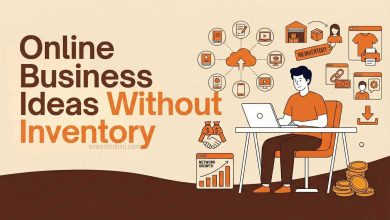Best Platforms to Sell Digital Products in 2025 : Comprehensive Guide
Platforms to Sell Digital Products : In the digital age, selling digital products has become one of the most scalable and profitable business models. With low overhead costs, the ability to automate delivery, and access to a global market, digital products are transforming how creators, educators, marketers, and entrepreneurs monetize their skills. As we step into 2025, the opportunities have grown even wider, and choosing the right platform has become more important than ever. From eBooks and courses to templates, music, graphics, and software, your choice of platform can directly influence your success.
Table of Contents
This comprehensive guide explores the best platforms to sell digital products in 2025, what makes each one unique, and how to choose the right one for your business.
1. Gumroad: Simple, Flexible, and Creator-Friendly

Gumroad remains a favorite among indie creators and solo entrepreneurs. Its simplicity, low barrier to entry, and focus on digital products make it an ideal starting point. Gumroad allows you to sell everything from PDFs, audio files, videos, memberships, to software licenses. In 2025, it has improved its analytics, email marketing features, and community-building tools.
Key Features:
- Instant product delivery
- Pay-what-you-want pricing model
- Email marketing integration
- Affiliate marketing options
- Direct payouts to creators
Best for: Creators selling art, music, eBooks, digital downloads, or building a community around a niche.
2. Shopify (with Digital Download Apps)
While Shopify is best known for physical product eCommerce, its flexibility allows you to create a powerful digital product store.
Also Read : PLR Digital Products : Unlocking Opportunities in the Digital Marketplace
Using apps like Digital Downloads, SendOwl, or Sky Pilot, you can turn your Shopify store into a full-fledged digital marketplace.
Key Features:
- Full control over branding and design
- Seamless checkout experience
- Integration with hundreds of apps
- Advanced analytics and automation
- Supports subscriptions and memberships
Best for: Entrepreneurs wanting a branded storefront and full control over marketing and customer experience.
3. Sellfy: All-in-One Platform for Digital Goods
Sellfy offers an all-in-one platform tailored for digital sellers. With features designed specifically for selling eBooks, software, music, videos, and courses, Sellfy also provides marketing tools like discount codes, upsells, and email campaigns. Its 2025 version boasts faster page loading, more payment gateways, and AI-powered product suggestions.
Key Features:
- No transaction fees on higher-tier plans
- Built-in store themes
- Product subscriptions
- Pay-what-you-want pricing
- Powerful analytics
Best for: Creators who want a fast setup with built-in marketing tools and don’t want to rely on third-party apps.
4. Teachable: Ideal for Online Courses and Coaching
Teachable remains one of the best platforms for selling online courses. In 2025, it continues to evolve with better UI, seamless video hosting, built-in quizzes, and certificates. It also supports coaching products and memberships, making it a top choice for educators.
Key Features:
- Drag-and-drop course builder
- Student analytics and engagement tools
- Integration with payment gateways and Zapier
- Support for coaching and live sessions
- Mobile-friendly course access
Best for: Educators, trainers, and professionals who want to sell structured learning experiences.
5. Podia: Courses, Downloads, and Memberships in One Place
Podia is a robust platform that allows creators to sell courses, digital downloads, webinars, and memberships—all without relying on third-party plugins. Its sleek interface and ease of use have made it increasingly popular in 2025, especially among creators and solopreneurs.
Key Features:
- All-in-one platform (courses, digital downloads, memberships)
- Built-in email marketing and messaging
- Webinar hosting with Zoom integration
- Zero transaction fees
- Affiliate program support
Best for: Creators who want to offer multiple digital formats without tech hassle.
6. Payhip: Versatile and Affordable
Payhip is ideal for creators who want simplicity with a touch of flexibility. It supports digital downloads, memberships, and online courses. With built-in EU VAT handling, affiliate marketing tools, and subscription models, Payhip is a go-to for creators across the globe.
Key Features:
- Easy digital product hosting
- Built-in tax and EU VAT management
- Secure download delivery
- Supports coupons, discounts, and affiliates
- Embeddable checkout buttons for external sites
Best for: Budget-conscious creators needing flexibility in product types and pricing models.
7. Etsy (Digital Downloads Section)
Etsy, while traditionally a marketplace for handmade goods, has a thriving digital downloads category. From digital planners to SVG files and printables, Etsy’s built-in audience and trust factor make it a great starting point for new digital product creators.
Key Features:
- Access to a large, loyal customer base
- Easy to list and manage digital files
- Built-in traffic from search and discovery
- Simple listing fees
Best for: Designers, artists, and crafters selling printable or downloadable items like templates, art, or planners.
8. Ko-fi: Great for Creators and Donations
Ko-fi is an excellent platform for creators who want to accept donations while also offering digital goods. In 2025, it supports digital downloads, memberships, and commissions, with minimal fees and an easy-to-use interface.
Key Features:
- One-time and recurring donations
- Sell digital downloads and commissions
- Membership tiers and rewards
- No platform fees on donations (Ko-fi Gold)
Best for: Artists, writers, and creators who want to monetize their content in a community-driven way.
9. ClickFunnels 2.0: Funnel-Based Digital Selling

ClickFunnels has evolved into a powerful tool for selling digital products via funnels. Whether it’s an eBook, a course, or a membership, ClickFunnels lets you create optimized sales funnels designed to maximize conversions. Its 2025 update includes AI-generated funnel suggestions and improved mobile experiences.
Key Features:
- Sales funnels tailored to digital products
- Upsells, downsells, and order bumps
- Membership site capabilities
- Drag-and-drop builder
- Integration with Stripe, PayPal, and email CRMs
Best for: Marketers and entrepreneurs who prioritize conversion optimization and sales automation.
10. Notion + Super.so or Potion.so (No-Code Digital Product Sites)
Notion isn’t a typical eCommerce platform, but in 2025, creators are using tools like Super.so and Potion.so to turn Notion pages into digital product stores. You can sell templates, guides, planners, and toolkits by integrating with Gumroad or Stripe.
Key Features:
- Fast and easy site creation via Notion
- Highly customizable with no-code tools
- Supports embeddable payment links
- Great for SEO and landing pages
Best for: Digital creators who want fast setup, SEO optimization, and creative flexibility with low overhead.
How to Choose the Best Platform for Your Needs
Choosing the right platform depends on your product type, budget, technical skills, and marketing strategy. Here are some factors to consider:
- Type of Product – If you’re selling a course, platforms like Teachable or Podia are ideal. For templates or eBooks, Gumroad, Payhip, or Etsy might be better.
- Level of Customization – Shopify or ClickFunnels offers more control over branding. Platforms like Gumroad or Payhip are more plug-and-play.
- Audience and Traffic – Marketplaces like Etsy offer built-in traffic, while Shopify and ClickFunnels require your own marketing.
- Fees and Pricing – Consider transaction fees, monthly subscriptions, and payout schedules.
- Scalability – If you plan to scale, choose platforms that support growth—affiliate programs, email marketing, and integrations.
Top Trends for Selling Digital Products in 2025
- AI-Powered Tools – Platforms are integrating AI for content creation, customer support, and marketing automation.
- Mobile Optimization – Mobile-first design is a must. Buyers are increasingly discovering and purchasing via phones.
- Micro-Products – Smaller digital products (e.g., 1-page templates, bite-sized courses) are becoming popular.
- Community-Based Selling – Building private communities (Discord, Slack, Telegram) where you sell exclusive content is rising.
- NFT-Linked Digital Goods – Some platforms are experimenting with blockchain-based ownership for digital products.
Platforms to Sell Digital Products – Conclusion:

There is no one-size-fits-all solution when it comes to selling digital products. Whether you’re just starting out or scaling an established brand, the best platform is the one that aligns with your goals, offers a seamless user experience, and supports your long-term growth. In 2025, the choices are broader and more powerful than ever before. From simple marketplaces like Gumroad to robust ecosystems like Shopify and Teachable, there’s a solution for every digital creator.
Buy Now : Ready Made Digital Store with 100 Digital Products
As the digital economy continues to expand, being intentional with your platform choice can lead to greater revenue, stronger branding, and a better experience for your audience. So evaluate your needs, test the platforms, and start building your digital product empire today.
Disclaimer: This content is for informational purposes only. Always do your own research before choosing a platform. Results may vary based on product type, market demand, effort, and audience size. We are not affiliated with or sponsored by any of the platforms mentioned in this article.
Keywords : Platforms to Sell Digital Products – Platforms to Sell Digital Products 2025 – Platforms to Sell Digital Products list



